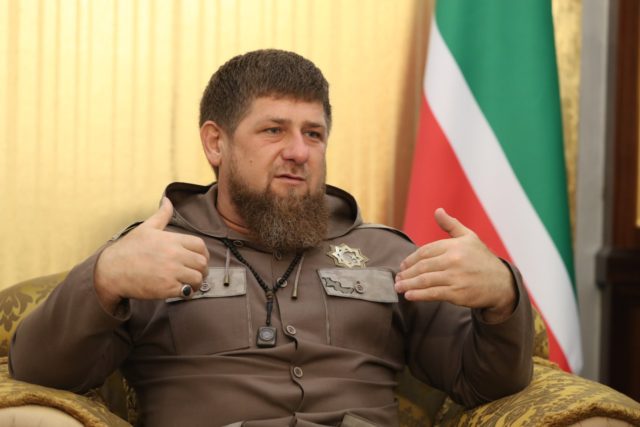
Kadyrov’s Brief Disappearance and Rumors of His Resignation Rattle Chechnya
Publication: Eurasia Daily Monitor Volume: 17 Issue: 6
By:

On January 20, Chechnya’s strongman, Ramzan Kadyrov, reappeared in public after more than a week of absence. Kadyrov presided over a government meeting in Grozny, at which he stated that he had no plans to take up employment outside the republic (Chechnya.gov.ru, January 20, 2020). Four days earlier, on January 16, Russian media outlets, citing unnamed Kremlin sources, started reporting that the Chechen governor would be stepping down from his position in order to become a special representative to President Vladimir Putin, in Moscow (Argumenty Nedeli, January 16, 2020). Other journalists alleged Kadyrov might represent Russia in the Middle East, specifically, in the countries of the Gulf (Chernovik, January 17, 2020). For the period of his “temporary incapacity,” Kadyrov had officially appointed the head of the government of Chechnya, Muslim Khuchiev, as the substitute governor (Chechnya.gov.ru, accessed January 21, 2020).
The multi-day lack of any official response to allegations that Kadyrov was resigning gave additional credence to the early reports. Chechnya’s residents noted that their ruler’s decree about his temporary replacement was dated January 13, but it was published on the official website only on January 15. Also, Kadyrov’s signature was missing from the document, which bore only his stamp and typed name. The Chechen governor was also notably absent from President Putin’s January 15 address to the nation; all other leaders of Chechnya were present at this event in Moscow. Finally, Chechens also noted that Kadyrov was not at Friday prayer services, which are normally broadcast on republican TV (Kavkazsky Uzel, January 20, 2020).
If Kadyrov were indeed forced to step down, it would signify a major reshuffle for Chechnya, the North Caucasus, and possibly the other republics in the Russian Federation. Many Russian observers argue that, after two devastating wars, relative peace in Chechnya was established only thanks to an informal pact between Ramzan Kadyrov and Vladimir Putin. Kadyrov received virtually unlimited power within the republic as well as lavish subsidies for Chechnya from Moscow; but in exchange, the Chechen strongman committed to the brutal eradication of the insurgency and regular declarations of his loyalty to the Kremlin. Exactly how much the peace in Chechnya depends on Kadyrov’s personality is unknown. Nevertheless, thanks to his role in incorporating the restive republic back into Russia, Ramzan Kadyrov accrued substantial political weight. For example, he is the only regional governor who regularly makes statements on Russian foreign policy. Relatedly, Kadyrov is known for his frequent voyages to Saudi Arabia and other Middle Eastern states. And last summer, Chechnya’s ruler even appointed the republic’s Deputy Mufti Turko Daudov as his representative to all Muslim countries (RIA Novosti, July 4, 2019).
The reports of Ramzan Kadyrov’s sudden “incapacity” curiously coincided with the surprise ousting of the Russian government and Putin’s announced constitutional reforms (see EDM January 16, 2020). This created suspicion that the two events were somehow connected. Some observers suggested that the Kremlin had sent Kadyrov an ultimatum, demanding his departure from Chechnya in order to ensure that the restive region remains firmly under Moscow’s direct control (Versiya, January 18, 2020). Others even speculated that disgruntled Russian security services officials (siloviki) had somehow managed to force Putin to dismiss Chechnya’s governor (Ekho Moskvy, January 21, 2020).
Kadyrov’s critics among Russian nationalists are unhappy about the Chechen ruler’s personal rapport with Putin and the power he has acquired due to that special relationship. Both Russian liberals and Russian conservatives habitually assert that Moscow might once again lose control over Chechnya after Putin leaves office since Kadyrov seems to have a personal loyalty to Putin himself—and not to the Russian state (see NCW, October 13, 2008; see EDM, February 5, 2015). So, Putin may have an incentive to show that his grip on Chechnya does not depend on Kadyrov.
After his reappearance yesterday, Chechnya’s ruler announced that he was creating an Advisory Council under the governor of the republic. The new body would consist of former officials who worked with Ramzan’s father and predecessor, Ahmad Kadyrov (Chechnya.gov.ru, January 20, 2020). Kadyrov also stated that after his career as a governor is over, he would like to become part of the newly created Council (TASS, January 20, 2020). In the past, the Chechen leader used to say that he was prepared to resign from his position as republic head (RIA Novosti, April 24, 2018); so it is quite notable that this time he offered no such hypothetical verbal pledge. Together, these signs may indicate that there was, indeed, pressure on Kadyrov to step down, and he has opted to try to fortify his position by creating new supportive bureaucratic structures.
Putin’s constitutional reforms are still unfolding, and it is unclear where they will lead. One of their potential targets could be Russian federalism, which is disliked by both Russian conservatives and many self-proclaimed liberals. Ironically, Putin’s ally and regional strongman Kadyrov is now a major obstacle to any Russian reforms that might aim at completely dismantling the federalist makeup of the country.
It is important to point out that Kadyrov’s authority rests on more than just Putin’s good will and continued subsidies from Moscow. Chechnya’s ruler also commands a one-of-a-kind republican army. In the process of suppressing the local rebel movement, the Russian authorities abundantly provided for the buildup of the Chechen security forces, which have remained under Kadyrov’s control even after the insurgency problem was largely solved. Given the rampant unemployment in Chechnya, disbanding multiple armed units could lead to unpredictable results. And troublingly for the Kremlin, it is also unclear if those forces would swear allegiance to whatever replacement to Kadyrov Moscow might send in the future.



